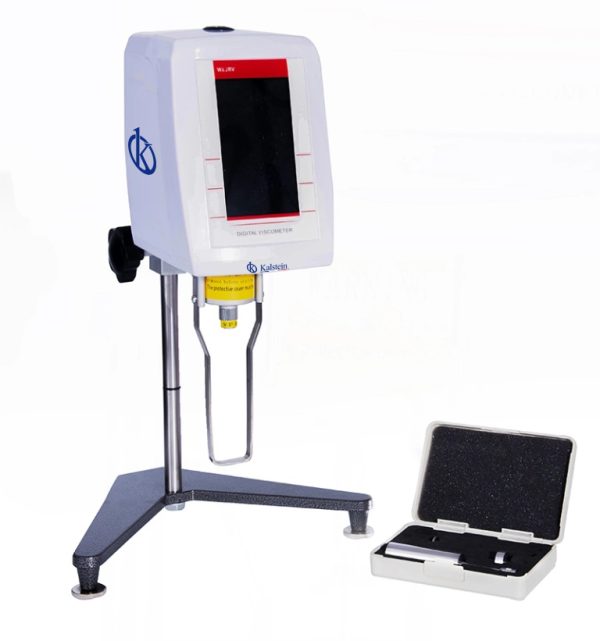The viscometer allows us to measure the viscosity of liquids and assess their flow properties. This equipment has various applications and can be used in different substances and materials. For its part, viscosity can be defined as the resistance of the molecules that form a liquid, to separate, due to their adhesion forces. Monitoring this property is essential, as it affects the performance of the liquid. For example, during pumping or channeling, or their ability to submerge and coat other elements.
The monitoring of this physical characteristic of fluids is important in the industrial sectors that manufacture liquid products or use them in their production processes. It is necessary to have the accurate measurement of the viscosity of a liquid, to ensure the control of processes in the industry and as an indicator of the quality of the final product.
In most industries, quality control laboratories are the primary users of viscometers. In some cases, samples of the fluids are collected at the production plant for transfer to the quality control laboratory, in order to perform the viscosity measurement. Other manufacturers perform viscosity measurements in-line, due to the characteristics of the industrial process.
The use of the viscometer for measuring and controlling viscosity is essential in the industrial sector. Although there are different models to measure this parameter, each one will be appropriate for the specific conditions of the manufacturing process.
Viscometers for industrial process control
Viscometers help process control by allowing the determination of viscosity during formulation, transport, storage and handling of suspensions, emulsions, solutions and melts. Process control allows industrial operations to be carried out efficiently, consistently and with the least variation possible.
Process control can be defined as the ability to monitor and adjust a process to deliver a desired result. It allows the maintenance of the quality of the final product and the improvement of the overall performance. In this type of control, viscometers facilitate the identification and correction of anomalies or variations, in the specifications of the manufactured liquids or of the fluids proper to the process.
For example, in the lubricants industry, the use of the viscometer for accurate viscosity measurement under process conditions is essential to ensure the quality of the final product. Repeatable and accurate viscosity measurements during production, will ensure product quality consistently.
Another valuable example is that observed during oil refining. The calculation of viscosity is important, because it is a key element to determine the amount of liquid that can be transported in a pipeline, during a specific period of time. Small changes in viscosity can have a dramatic impact on the properties of this type of fluid.
Likewise, in the manufacture of glass, the control of viscosity is carried out throughout the manufacturing process, because this parameter has an important effect on other physical properties, such as melting, softening and crystallization.
Viscometers for quality control of the final product
Viscosity measurement is an essential verification in the production and mixing of lubricating oils, and is an important part of quality control in this industrial sector.
Quality control is focused towards the fulfillment of the quality standard, as defined by the manufacturer. This includes product assessments and verification of product conformity, with an acceptable level of consistency between batches.
The sectors where lubricants are widely used include, automotive, chemical, construction, textile, infrastructure, agriculture, mining and oil extraction, construction, steel and cement, wind, marine and aerospace, among others.
Due to the wide scope of application of lubricants, the quality control of these products is rigorous and the viscosity requirements strictly adhered to.
If the viscosity of a lubricant is too high, there will be a problem of fluidity in the product, which causes greater friction and heat, acceleration of the oxidation process, shortening the useful life of the lubricant, increased energy consumption, greater wear of the equipment, with the consequent increase of repairs and shortening of the useful life of the components.
In contrast, if the viscosity of a lubricant is too low, the fluid will not adequately cover and protect the parts, resulting in component wear, increased repairs or component replacements. Increased friction and heat, promoting faster oxidation, greater varnish and sludge formation, and increased energy consumption.
In addition to what is discussed in the previous paragraphs, the use of the viscometer for the verification of the quality of the final product is likewise essential in the food and beverage industry, cosmetics, biotechnology, paints and adhesives.
Kalstein Viscometers
At Kalstein we offer a wide variety of YR series viscometers, with models that you can choose according to the needs of your industry. Kalstein equipment offers stability, accuracy and precision in the measurements made. In addition, they are designed with an LCD screen that facilitates the configuration and display of the parameters of the measurement being made. For more information on Kalstein viscometers, visit the HERE
We are manufacturers, so in Kalstein you can make the purchase of viscometers at advantageous prices. For more detailed information, visit HERE

